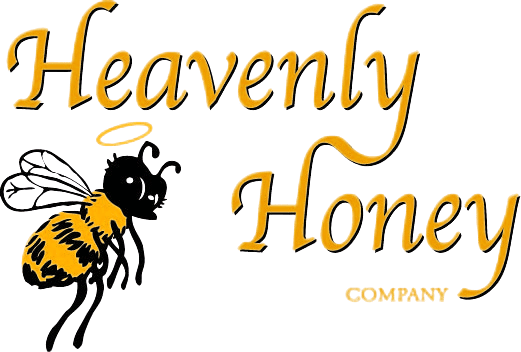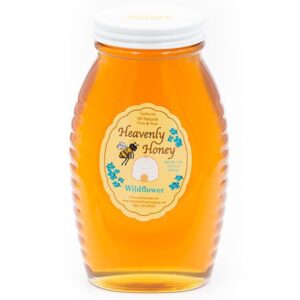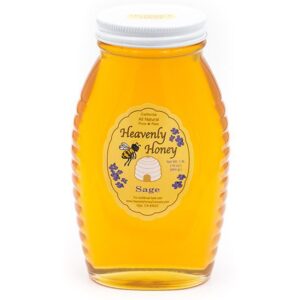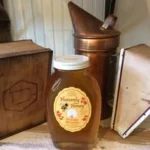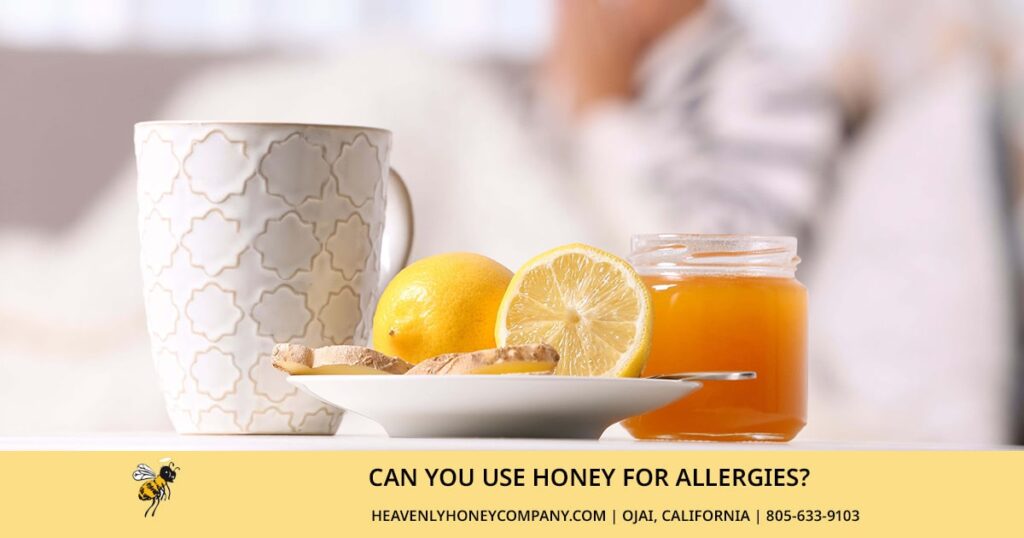
Heavenly Honey Company is proud to offer a natural solution to the nuisance of allergies that plagues many people. Allergies can cause a range of symptoms, from mild to severe, including sneezing, coughing, and even anaphylaxis. While there are many remedies, one solution that has been gaining attention lately is honey. But is honey for allergies really an effective treatment? Let’s explore this topic further.
What Causes Allergies?
Before we delve into the honey solution, let’s first understand what causes allergies. The immune system is tasked with protecting the body against disease and infection. But it can also mistake harmless substances, called allergens, for dangerous invaders. When this happens, your immune system reacts by making antibodies that identify the allergen as harmful and attacking it.
Most commonly, allergy symptoms are caused by various airborne particles, such as dust mites and mold spores; animal dander (flakes of scaly, dried skin or saliva from your pets); and pollen from grass, ragweed, and trees. The body’s response to these allergens triggers a range of symptoms, including runny nose, itchy eyes, swelling of the face and throat, coughing, and sneezing.
Some people experience a more serious allergic reaction called anaphylaxis. This can cause a drop in blood pressure, difficulty breathing, and severe skin reactions such as hives or swelling of the lips, tongue, or throat. Some allergies, such as food allergies, are hereditary. It’s very common for someone to have a parent or sibling with an allergy.
Our Raw Unfiltered Honey is the perfect addition to your pantry!
The market for natural and healthy products is growing, and our raw unfiltered honey is at the forefront of this trend. By incorporating our raw unfiltered honey into your diet, you can enjoy a range of health benefits and contribute to a more sustainable food system. Order yours today!
-
 Pure & Raw Wildflower Honey$ 5.25 – $ 60.00
Pure & Raw Wildflower Honey$ 5.25 – $ 60.00
-
 Pure & Raw Sage Honey$ 5.25 – $ 60.00
Pure & Raw Sage Honey$ 5.25 – $ 60.00
Explore the wonders of honey and read how you can use honey for allergies below!
How Does Honey Work For Allergies?
Honey has been renowned for its natural healing properties, specifically its ability to alleviate allergy symptoms. The concept behind this theory is that the consumption of honey, derived from locally sourced flowers, allows for the gradual exposure of the body to small quantities of the allergens that incite the allergic reaction.
This, in turn, aids in building the body’s immunity towards these allergens and helps reduce the severity of the symptoms. This therapeutic property of honey can be attributed to trace amounts of pollen grains and other immune-stimulating components in honey, which work in tandem to boost the body’s immune response.
Long-term consumption of honey may also act as a preventive measure against allergies, as it enables the body to tolerate the allergens present in the local environment. Thus, honey has been widely recognized as a safe and natural alternative to conventional allergy medications and is recommended by many health practitioners as a complementary therapy for managing allergy symptoms.
Is There Any Science Behind This?
While the idea of using honey for allergies may seem like an old wives’ tale, there is actually some scientific evidence to support it. A study published in the International Archives of Allergy and Immunology found that consuming honey made from local flowers can reduce allergy symptoms by up to 60%.
The idea behind this is that it can lessen your sensitivity to seasonal allergy pollen, according to Dr. Wright, the director of the Allergy Treatment Center at the Mayo Clinic. This process is called allergen desensitization. It’s a technique that’s also used in allergy shots, which gradually exposes you to an allergen so that your body becomes less sensitive to it.
Some research has shown that honey can relieve allergy symptoms. It may also have an anti-inflammatory effect on the immune system, which could help reduce sneezing and itchy eyes. It also acts as a humectant, which helps keep the airways moist and prevent inflammation from occurring. This can also protect against coughing and wheezing that can occur with asthma.
What Type of Honey Is Best for Allergies?
If you suffer from allergies, you may have heard that consuming honey can help alleviate your symptoms. However, not all types of honey are created equal when it comes to treating allergies. To get the most effective relief, it’s important to choose the right kind of honey.
One of the most important factors to consider when selecting honey for allergies is the source of the pollen. Honey made from local flowers is generally the best choice, as it will contain pollen from the same plants that trigger your allergies. This is because when bees collect nectar from flowers, they also collect pollen, which can end up in the honey.
To get the most out of honey as an allergy treatment, it’s also important to choose raw, unfiltered honey. This type of honey has not been super filtered (a process that removes pollens and enzymes from the honey so it won’t crystallize on the store shelves) and or heated, which means it retains more of its natural pollen levels. Heating or super filtering honey can destroy the pollen, enzymes and other beneficial compounds, which reduces its effectiveness as an allergy treatment.
When shopping for honey, be sure to check the label carefully. Look for honey that specifically states that it is raw and unfiltered, and that it comes from local sources. While it may be more expensive than processed honey, raw, unfiltered honey is often more potent and effective at treating allergies. So, investing in high-quality honey may be worth it in the long run if it helps you breathe easier and feel better during allergy season.
A Heavenly Honey Company, we suggest our Wildflower honey to our customers. We don’t make this suggestion lightly! After years of customers coming back to the Tasting Room and sharing their success with our Wildflower Honey (without us originally suggesting it) we feel confident in sharing this with you. The beauty of the Wildflower Honey is that here, in California, the wild flowers from the northern Central Coast to the Mexico border along the coastal range and about 60 – 100 miles inland are all pretty much the same. That means Wildflower Honey made in Ventura County will still help you if you live in San Luis Obispo or San Diego!
How Much Honey Should You Take?
When it comes to using honey as a natural remedy for allergies, determining the appropriate amount can be a crucial factor in achieving effective relief. The quantity of honey to take largely depends on the severity of your allergy symptoms. While some individuals may find that consuming a tablespoon of honey in the morning and evening adequately addresses their symptoms, others may require more or less.
To ensure that you receive the desired benefits from consuming honey, it’s recommended that you start with a small amount and gradually increase the quantity over time. This incremental approach can help you avoid any negative reactions and allow your body to adjust to the introduction of honey. Just remember, honey isn’t an antihistamine drug and does not work like one you might take at the time of an allergy attack. It works over time, you are training your body to not react to the pollens through a process called micro-dosing. Daily ingestion of honey is the goal for optimal results.
It’s worth noting that the specific type of honey you choose may also play a role in determining the ideal dosage for your needs. The potency of different types of honey can vary greatly, with some having stronger therapeutic properties than others. Consulting with a healthcare professional or a certified nutritionist may also be helpful in determining the appropriate amount of honey to consume based on your individual allergy symptoms and overall health.
Are There Any Risks to Using Honey for Allergies?
Generally speaking there are few to no risks to eating honey for allergies. Of course you know your body better than anyone so listen to it! If you’ve never eaten honey and have no idea how your body will react to it, perhaps speaking to a doctor first to develop a plan will be a good idea. Doctors are starting to understand the benefits of honey for our health and more and more of our customers are telling us their doctors sent them to us for honey to help with their allergies and sore throats, this is a wonderful trend!
NOTE: honey should never be given to infants under the age of one as their delicate tummies are not yet able to handle the natural botulism spores that can sometimes occur in honey.
Other Natural Remedies for Allergies
While honey may be effective for some people, it’s not the only natural remedy for allergies. Here are a few other remedies to consider:
- Apple cider vinegar: Drinking a mixture of apple cider vinegar and water can help to clear nasal congestion and reduce allergy symptoms.
- Probiotics: Taking probiotics can help to strengthen the immune system and reduce inflammation, which can help to alleviate allergy symptoms.
- Saline nasal rinse: A saline nasal rinse can help to flush out allergens from the nasal passages and reduce inflammation.
Can You Use Honey For Allergies Conclusion
After careful consideration of the scientific evidence available, it is possible to conclude that honey can be used as a complementary treatment for allergies. However, it’s essential to keep in mind that not all types of honey are equal in terms of their effectiveness in treating allergies. For the best results, it is recommended to use raw, unfiltered honey that has been sourced from a wide variety of local flowers. Different floral nectar contributors equals more variety of pollens in the honey which means better results for allergy relief over time.
At Heavenly Honey Company, we are dedicated to providing raw, unfiltered and high-quality honey that can help improve your overall health and well-being. We strive to source our honey from local bees and flowers, ensuring that you receive the purest and most effective honey possible.
Raw honey that has not been filtered or processed contains high levels of pollen, which is the substance that triggers allergies. When you consume this type of honey, it exposes your body to small amounts of allergens, which can help build up your immune system’s tolerance and reduce allergic reactions. Buzz word: Microdosing.
It is also important to note that honey is not a quick fix for allergies, and it may take several weeks or even months to see noticeable results. Therefore, it’s advisable to start with a small amount of honey and gradually increase your daily intake over time.
Moreover, if you have a history of severe allergic reactions or are unsure about whether honey is suitable for you, it’s crucial to consult your healthcare provider before incorporating honey into your diet.
